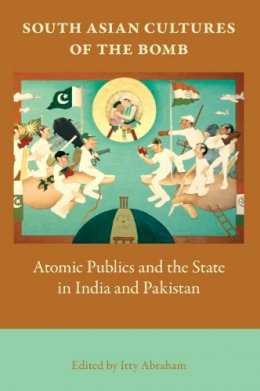
Stock image for illustration purposes only - book cover, edition or condition may vary.
South Asian Cultures of the Bomb: Atomic Publics and the State in India and Pakistan
Abraham
€ 34.39
FREE Delivery in Ireland
Description for South Asian Cultures of the Bomb: Atomic Publics and the State in India and Pakistan
Paperback. A collection of essays that examines the political and ideological components of national drives to possess and test nuclear weapons. Editor(s): Abraham, Itty. Num Pages: 240 pages, 21 b&w photos. BIC Classification: 1F; GTB; JPA. Category: (P) Professional & Vocational. Dimension: 5969 x 3963 x 15. Weight in Grams: 372.
Since their founding as independent nations, nuclear issues have been key elements of nationalism and the public sphere in both India and Pakistan. Yet the relationship between nuclear arms and civil society in the region is seldom taken into account in conventional security studies. These original and provocative essays examine the political and ideological components of national drives to possess and test nuclear weapons. Equal coverage for comparable issues in each country frames the volume as a genuine dialogue across this contested boundary.
Product Details
Format
Paperback
Publication date
2009
Publisher
Indiana University Press United States
Number of pages
240
Condition
New
Number of Pages
240
Place of Publication
Bloomington, IN, United States
ISBN
9780253220325
SKU
V9780253220325
Shipping Time
Usually ships in 7 to 11 working days
Ref
99-50
About Abraham
Itty Abraham is Associate Professor of Government and Director of the South Asia Institute at The University of Texas, Austin. He is author of The Making of the Indian Atomic Bomb and editor (with Willem van Schendel) of Illicit Flows and Criminal Things: States, Borders, and the Other Side of Globalization (IUP, 2006).
Reviews for South Asian Cultures of the Bomb: Atomic Publics and the State in India and Pakistan
"[The author] Abraham has brought together scholars writing on both Pakistan and India to reflect on the place of science, the atomic question, popular culture and the state. In doing so, he has managed to push forward a perspective that is transnational in a meaningful way for the subcontinent. . . . Vol. 43.2 June 2010"—Jahnavi Phalkey, British Journal for the History of Science "For the first time scholars in this book present a multivoiced assessment of the subtle sociocultural effects of the 1998 nuclear tests in India and Pakistan. ...This book proves conclusively, again, that a partition done haphazardly in 1947 led to very different experiences in the evolution of military–industrial–political complexes in each country. But where others have focused largely on states and strategic cultures, these authors, under Abraham's able editorship, show how these two atomic publics are constructed and interact with their surroundings.Vol. 83.2 June 2010"—Robert S. Anderson, Simon Fraser University, Burnaby, Canada "[A]n illuminating volume on the ways in which modern science, state secrecy and popular culture have been used to sanction active atomic weapons projects in India and in Pakistan. Those interested in cultural insights into how and why South Asia became a nuclear flashpoint will find this book indispensable."—Arvind Rajagopal, author of Politics After Television: Hindu Nationalism and the Reshaping of the Public in India "Many observers trace the origins of the nuclear 'problem' in South Asia to 1998, the year in which India and Pakistan together conducted 11 nuclear tests and declared themselves nuclear powers. Some, more historically minded, trace the coming of the nuclear age to South Asia to 1974, when India set off a single underground 'peaceful' nuclear explosion. Both views are substantially wrong. The people of India and Pakistan have been subject to nuclear power for over 60 years. . . . [N]uclear matters became a part of the region's conceptual and industrial landscape from practically the moment of political independence."—from the introduction
